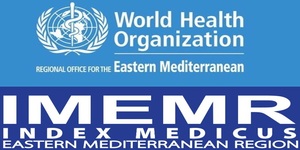The Relation Between Thyroid Function and Auto-Antibodies in Graves' Disease and Non-Autoimmune Hyperthyroidism Disease in AL-Najaf Province
DOI:
https://doi.org/10.36321/kjns.vi20153.2743Keywords:
Graves' disease (GD), T3, T4, TSH, Anti-TSHR-Ab, Anti-TPO-AbAbstract
Objectives: The aim of presented study was evaluated the role of some immunological parameter associated with Graves' disease and comparison that with other non-autoimmune hyperthyroidism, by the following objectives: (1) measurement T3, T4 and TSH. (2) Evaluation of Anti-TSHR-antibody. (3) Estimation Anti-TPO antibody.
Methodology: A case control study included patients with early diagnosis with thyrotoxicosis. Whole blood samples were collected of 73 cases in hormonal unite at Al-Sadder Medical City, Najaf, Iraq, in the period between May, 2011 to Oct., 2011. Out of the 73 hyperthyroidism patients, there were 48 females and 25 males, the patients' age range was between (15-50) years. All patients with hyperthyroidism under treatment and pregnant women excluded of the study. Statistical analysis was done by using SPSS version 20 in which include the followings: (1) ANOVA (analysis of variance) and LSD test (F-test). (2) persons correlation (r), coefficient for measurement data.
Results: According to the results of this study, the female: male ratio (2.17:1) in GD patients and (1.37:1) with non-autoimmune hyperthyroidism group, which detects more frequent in females (68.5% and 57.9%, respectively) than males (31.5% and 42.1%, respectively). The age group between (36-50) years with GD it is the most vulnerable age group was recorded (66.7%), followed (26-35) years age group (20.4%) and (13.0%) in age group (15-25) years. However, hormonal tests (T3, T4 and TSH) levels were highly significant difference (P<0.001) between GD patients and other groups (non-autoimmune hyperthyroidism and healthy control). Furthermore, the levels of Anti-TSHR antibodies were highly significant between GD patients (P<0.001), and both non-autoimmune hyperthyroidism patient and healthy control, while there was no significant difference between non-autoimmune hyperthyroidism and healthy control groups (P>0.05). Additionally, the serum levels of thyroid peroxidase (TPO) was a highly significant difference between GD patients and (non-autoimmune hyperthyroidism and health control) (P<0.01), while no significant difference between non-autoimmune hyperthyroidism and healthy control P>0.05). Anti-TSHR antibodies have a highly significant positive correlation (P<0.01) with (T3 and T4) hormones (0.583 and 0.536, respectively) and a highly significant (P<0.01) but negative correlation with TSH hormone (-0.475).
Conclusion: Anti-TSHR antibodies assay is helpful in diagnosis of autoimmune GD, as they can be detected very early in AITD. They may predict the eventual development into AITD when founded in making them a good diagnostic marker.
Recommendation: For adults, the best recommendation may be to put thyroid function testing (TSH, T4, T3) on your list of health care provider.
Downloads
Downloads
Published
How to Cite
Issue
Section
License
Copyright (c) 2022 EmanThabitNadhaif/ /Dr. Mohammed A.K. Al-Saadiprof /Dr. Salman A.A. AL-Jibouri prof

This work is licensed under a Creative Commons Attribution 4.0 International License.













